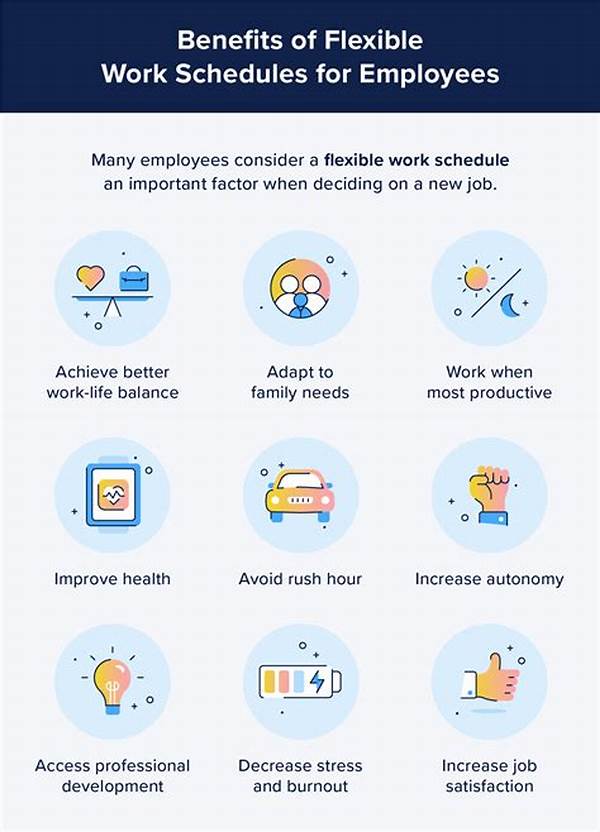Hey there, fellow work-life balance seekers! You know, in the hustle and bustle of today’s fast-paced world, who wouldn’t want a little more flexibility? Whether you’re a night owl, a morning lark, or just someone sick of the daily commute, flexible work schedules are making waves. Let’s dive into some of the reasons why they might just be your new best friend.
Read Now : Dynamic Movement Choreography Classes
The Freedom to Work on Your Own Terms
When it comes to the advantages of flexible work schedules, the biggest win is the freedom it grants you. Imagine deciding to work from your favorite coffee shop on a sunny Tuesday or wrapping up early to catch a yoga class. Sounds like a dream, right? This flexibility caters to your personal rhythms, allowing you to work when you’re most energized and focused.
Besides, who can resist the allure of ditching the 9-to-5 grind? With flexible schedules, you’ll find that your work-life balance improves significantly. Suddenly, you’ve got time for a leisurely breakfast with your family or an afternoon stroll in the park. By tailoring work around your life, rather than the other way around, you’ll experience less stress and more joy.
Moreover, this model is a godsend for those balancing multiple roles. Whether you’re a caregiver or pursuing further studies, flexible schedules offer the adaptability you need to fit everything in. The modern work landscape is evolving, and embracing flexibility can be one of the best choices both employers and employees make.
Boosting Productivity and Satisfaction
1. Enhanced Focus: One of the advantages of flexible work schedules is the ability to choose your most productive hours, resulting in better work quality.
2. Reduced Burnout: Say goodbye to the grind! Flexibility helps alleviate stress and prevents burnout, keeping you at your best.
3. Creative Freedom: Enjoy the luxury of working in environments that spark creativity, whether it’s a bustling cafe or your home office.
4. Time Management: Juggling different responsibilities becomes easier when you control your schedule, leading to effective time management.
5. Increased Job Satisfaction: Employees often report higher satisfaction levels when they have a say in their work hours, thanks to the advantages of flexible work schedules.
The Impact on Company Culture
Let’s talk about how the advantages of flexible work schedules aren’t just great for individuals—they’re a game-changer for company culture too. When companies adopt flexible schedules, they often see a dramatic shift towards more positive and inclusive work environments.
Team members feel trusted and valued when given the autonomy to manage their own time. This sense of empowerment can enhance motivation and loyalty, building a strong, cohesive team. Companies that prioritize flexibility often find themselves on top lists for great places to work, attracting top talent who love this new age perk.
Plus, with employees spread out working from different locations or varying hours, businesses become more adept at technological communication and collaboration tools. This not only enhances efficiency but also keeps everyone connected and engaged, regardless of where they are working from.
Read Now : Effective Work-life Balance Strategies
How to Get Started with Flexibility
If you’re intrigued by the advantages of flexible work schedules, you might be wondering how to kick-start this shift. First up, communication is key. It’s essential to clearly lay out expectations with your boss or HR about what flexibility means to you and how it can benefit the team.
Next, embrace technology. Tools like Slack, Zoom, or project management software are your best buddies in making remote and flexible work smooth as butter. They keep communication clear and projects on track, without the need for constant face-to-face check-ins.
Finally, start small. Maybe begin with a few remote days a month and gradually transition into a more flexible routine. This will give you—and your employer—the chance to adapt to this new way of working and iron out any kinks.
Potential Roadblocks and Solutions
So, what’s the catch? Well, even with all these advantages of flexible work schedules, it’s not always a bed of roses. Let’s look at some potential hurdles.
First off, without the routine of a fixed schedule, some folks might feel isolated or detached from the office camaraderie. The key here is staying proactive in communication, maybe scheduling regular catch-up calls with coworkers or planning occasional in-person meetups.
Another snag could be the challenge of self-discipline. With more freedom comes more responsibility to keep yourself accountable. Creating a daily routine and setting clear deadlines can help maintain your productivity levels.
Lastly, remember that flexibility should be a two-way street. While it’s great to enjoy the perks of flexible hours, it’s equally important to ensure your work commitments are met efficiently. This balance is crucial for long-term success and job satisfaction.
Wrapping It All Up
By now, you’re probably imagining the possibilities and grinning ear to ear. The advantages of flexible work schedules are not only beneficial for you but also a win-win for employers. This synergy between personal freedom and professional efficiency is paving the way for a happier, more productive workforce.
In summary, flexible work schedules are transforming the traditional work model, and for good reason. They bring about better work-life balance, increase job satisfaction, and promote a healthier, more enjoyable working environment. So, whether you’re looking to embark on this flexible journey yourself or you’re an employer considering offering this option, remember—it’s all about finding what works best for everyone involved. Here’s to a future where work adapts to life and not the other way around!
